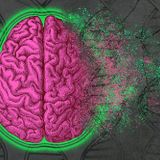RECENT ARTICLES

Decoding the complexity of Alzheimer’s disease
In hopes of discovering new targets for potential Alzheimer’s treatments, MIT researchers have performed the broadest analysis yet of the genomic, epigenomic, and transcriptomic changes that occur in every cell type in the brains of Alzheimer’s patients.Credit: Christine Daniloff and José-Luis Olivares, MIT; iStockImages for download on the MIT News office website are made available to non-commercial entities, press and the general public under aCreative Commons Attribution Non-Commercial No Derivatives license.You may not alter the images provided, other than to crop them to size. A credit...…In hopes of discovering new targets for potential Alzheimer’s treatments, MIT researchers have performed the broadest analysis yet of the genomic, epigenomic, and transcriptomic changes that occur in every cell type in the brains of Alzheimer’s patients.Credit: Christine Daniloff and José-Luis Olivares, MIT; iStockImages for download on the MIT News office website are made available to non-commercial entities, press and the general public under aCreative Commons Attribution Non-Commercial No Derivatives license.You may not alter the images provided, other than to crop them to size. A credit...WW…

Neuroscientists discover a molecular mechanism that allows memories to form
Explore:Explore:Explore:Neuroscientists discover a molecular mechanism that allows memories to formSarahMcDonnell617-253-8923617-258-8762MIT News OfficeWhen the brain forms a memory of a new experience, neurons called engram cells encode the details of the memory and are later reactivated whenever we recall it. A new MIT study reveals that this process is controlled by large-scale remodeling of cells’ chromatin.This remodeling, which allows specific genes involved in storing memories to become more active, takes place in multiple stages spread out over several days. Changes to the density...…Explore:Explore:Explore:Neuroscientists discover a molecular mechanism that allows memories to formSarahMcDonnell617-253-8923617-258-8762MIT News OfficeWhen the brain forms a memory of a new experience, neurons called engram cells encode the details of the memory and are later reactivated whenever we recall it. A new MIT study reveals that this process is controlled by large-scale remodeling of cells’ chromatin.This remodeling, which allows specific genes involved in storing memories to become more active, takes place in multiple stages spread out over several days. Changes to the density...WW…
- Total 2 items
- 1